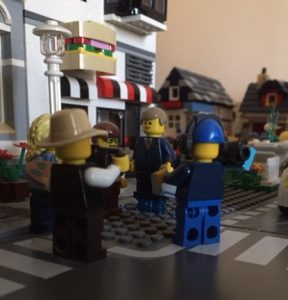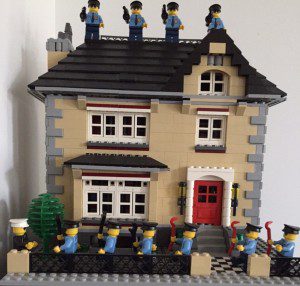Lost Your Democracy? How Long Will It Take to Get It Back?
We don’t know exactly what will happen after January 20, 2017. This could turn out to be an ordinary election in which I’m disappointed in the outcome but not a Game Over moment in terms of liberal democracy. I do expect we’ll know pretty quickly after Inauguration Day whether or not we in the United States can count on the constitutional rights that we have come to take for granted, and whether rule of law will be replaced by “the law is what we say it is.” In any case, I intend to continue this blog, bearing witness for readers in the U.S. and around the world and recommending books that enhance intercultural understanding and reflect a commitment to human rights. I will also let readers know what’s going on with my own books, including the two forthcoming translations from Portuguese that have much to say about the current situation — Henriqueta Cristina and Yara Kono’s Three Balls of Wool (Can Change the World), coming from Enchanted Lion at the end of February, and Davide Cali and Marco Somà’s The Queen of the Frogs, coming from Eerdmans in March.
I’ve read online that the average time it took for an elected leader in the 20th century to suspend the rule of law and install himself as a dictator was four months. Granted, there were very few cases, but in the previous century, it was clear from the start that Hitler, Mussolini, and Dollfuss were not ordinary conservative politicians. In the current century, we’ve seen a more gradual erosion of civil liberties, human rights, and the rule of law in the cases of Putin and Erdogan, and Erdogan, elected prime minister in 2003 and president in 2014, waited for an attempted coup to crack down completely, though the seeds of despotism had already been planted years earlier. Duterte in the Philippines, has moved far more swiftly after promising he would kill 100,000 “criminals” in his first six months of power if elected. (What kind of country would elect a leader who promised to kill 100,000 people? Never mind…)
I decided to follow up the online estimate of speed of crackdown with a little research of my own. How long did it take in the 20th century for freedom loving people to get their democracy back after it had been lost? I had a few more countries to work with because I didn’t restrict myself to ones in which the people elected a dictator. The 11 12 countries I included had an elected government before the dictator came to power (which leaves out some of the most notorious authoritarian regimes like the USSR) and were not invaded and occupied by a foreign power (as was much of continental Europe in the 1930s and 1940s), though in most cases their democracies were short-lived.

At a press conference, Mayor de Blasio pledges to protect those in our city threatened with hate crimes and deportation.
The Spanish Republic, for instance, was in power for five years from 1931 to 1936 before General Franco’s troops started the Spanish Civil War. The Weimar Republic in Germany, imposed by the Allies after the First World War, held onto power for 15 years before Hitler became Chancellor of a coalition government that he immediately dissolved. In contrast, only two countries in my survey, Chile and Uruguay, had a history of democracy dating to or before the 20th century, but they had various short periods of dictatorship and chronically weak opposition parties even before the era of the Dirty Wars in the 1970s and 1980s. One country, the Philippines under Marcos, followed the same pattern as Erdogan of an elected leader who declared himself dictator after an attempted coup.
In all, four countries (Italy, Germany, Austria, the Philippines) elected the man who would, sooner or later, impose a dictatorship. Spain’s dictatorship followed a three-year civil war that also served as a proxy war between Germany and Italy on one side and the Soviet Union on the other. Two countries, Portugal and Argentina, lost their weak democracies to military coups with little or no outside help, and in three other South American countries — Brazil, Chile, and Uruguay — the military had various levels of support from the U.S. Central Intelligence Agency. Greece, the birthplace of democracy, experienced a military coup with alleged U.S. interference, but U.S. involvement had been more or less ongoing since the country’s bloody civil war following the end of World War II.
I included South Africa in my survey even though the country continued to have elections after the Nationalists became the dominant party in 1948 because of the disenfranchisement of the majority non-white population, which suffered repression as onerous as any dictatorship, and because of the statutory weakness of the opposition. In many ways, I see the South African case, and the weakened state of the Progressive Party due to voting restrictions and restrictions on civil liberties, as a model for what may happen to the Democratic Party in the U.S.

My “Dirty War House” model that was part of a human rights art exhibit in the Netherlands a year ago. Who would have thought…?
So the number: 21 years. Yes, on average, it took 21 years for democracy to return to formerly democratic nations that had lost their freedom for any reason except invasion and occupation by a foreign power.
In general, the briefest dictatorships were ones in which the country got into a war and lost — Argentina (7 years) in the Falklands/Malvinas War, Greece (7 years) in a proxy war with Turkey over Cyprus, and the Axis Powers (12, 12, and 21 years) in World War II. In only one country, Portugal, did a military coup end a dictatorship, and that was after 48 years and a low-grade colonial war that was bankrupting the country and driving hundreds of thousands of young people to emigrate. In Spain, the dictator’s death led to democracy — after 37 years. All of the other countries had a negotiated end to absolute or one-party minority rule following years of violence (Philippines, 14 years), economic failure (Brazil, 21 years, Uruguay, 12 years), and/or boycotts (South Africa, 46 years), and in the case of Chile (17 years), a plebiscite in which Pinochet ran as the only candidate and lost.
Lost your democracy? Getting it back takes a very long time, and the sacrifice of the entire population. In the next few months, we need to stay vigilant and do everything we can to keep this from happening in the first place.
[Note: Updated 12/6/16 to add Greece to the list.]








Okay, Lynn, you’re depressing the poop out of me. However, I agree it’s best to know the historical precedence.
I’m sorry, Patrice. But we still do have elected officials who can potentially stand up to multiple assaults on the Constitution and rule of law. Just because 20th century conservative lawmakers in Germany, Austria, and Italy rolled over for dictators doesn’t mean ours (including some of the moderate Republicans out your way) can’t be our heroes. We do have the benefit of knowing this history and the possibility that we have learned from it.
Excellent research, Lyn. Well done.
Thank you, Nicole! I knew I’d find a use for all that history I studied over the years.
Good work Arlyn .. Nice to have the situation sorted out …
Thank you, Paula! I’ve always regretted not paying more attention in math class, but I at least learned something.
Very well done, Lyn!
Thank you, Linda! I hope it doesn’t come to this.
Useful reasearch, Lyn, and a good warning to those who think it’s unthinkable. Vigilance about erosion is crucial. I could go on and on as the rest of the civilized world watches, waits, fights as it can, and fears.
Thank you, Nanette! I’ll have to say I’m heartened by the response of Austrian voters, who turned back nationalist Norbert Hofer last weekend, by a far larger margin than in the earlier election that had to be redone. When Brexit happened, I worried that the plague would spread but hoped a policy choice would prove different from a candidate whose flaws made him a national and global danger. Obviously, my hope did not come to pass. Now I hope the US example serves as a warning to other democracies.
Oh, Lynn! I’m afraid we are not on a fast track.
The big question now is whether we lose our democracy and if so, how long it will take to do so. The four months to suspension of civil liberties and rule of law was only for the three countries of Europe where there was an elected leader (or maybe it also included the military coup countries such as Portugal and Greece). It apparently did not include the Philippines, where Marcos only imposed martial law several years after his election after an attempted coup against him, a pattern that Erdogan has followed in the current century. It is possible that Trump will fail to implement an authoritarian state or be impeached. My husband thinks the first warning sign will be the mobilization of paramilitaries because otherwise he’d have a hard time enforcing authoritarian rule with a military and civil service committed to the norms of democracy.